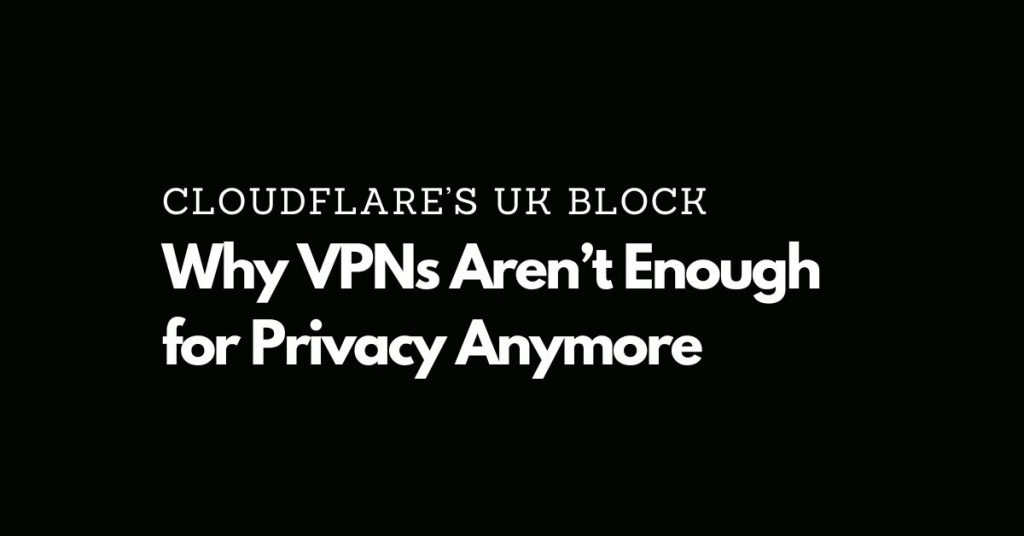This summer marks a significant shift for internet users in the UK, with many unaware of the changes. Cloudflare, known for its speed and privacy features, began blocking hundreds of piracy-related websites for UK users. This move is distinct from traditional ISP bans or streaming rights battles. Cloudflare’s enforcement doesn’t affect regular connections only. It also targets VPN traffic if it routes through the UK.
This change leaves millions using VPNs for privacy unable to circumvent the new restrictions. The war between copyright enforcement and open access, has tangible effects on privacy-focused users. As one of the internet’s primary gateways sets a precedent for court-mandated blocks at the DNS and CDN levels, the conventional privacy strategies may no longer be effective.
Blockade Update: What Cloudflare Did and Why It Matters Now
In July 2025, Cloudflare initiated a block on access to hundreds of streaming and piracy-related websites, affecting only those in the UK. This action marks Cloudflare’s first compliance with a UK court requirement to block sites at the network intermediary level. Previous UK anti-piracy efforts relied on major ISPs like BT, Sky, and Virgin Media enforcing website blocks, which VPNs with UK endpoints could often bypass.
Cloudflare’s action redefines this situation. Acting on a legal order reportedly served by a law firm for the Motion Picture Association, Cloudflare is now blocking around 200 domains with an HTTP 451 error, indicating a legal restriction. Initially targeting 14 sites, Torrentfreak estimates the block now covers hundreds.
Unlike ISPs, Cloudflare provides core DNS resolution and web delivery services that many rely on. Upon detecting a UK IP address (even via a VPN) Cloudflare automatically enforces the block. This occurs before traditional privacy tools like VPNs or third-party DNS can intervene, leaving users expecting VPN anonymity stuck. Connecting through a VPN outside the UK could still work, but the trend of intermediary blocking is evident, shaking the old privacy assumptions.
The Changing Guard on Internet Control
Cloudflare’s approach highlights a shift in how national internet rules are enforced, as network intermediaries like Cloudflare become direct participants rather than leaving it to ISPs. Traditional privacy methods like switching DNS providers or using a local VPN endpoint have become ineffective in the UK. The block applies even when connecting via a UK VPN, undermining legitimate VPN and DNS use for privacy-minded users who wish to avoid local tracking or censorship.
This sets a precedent with broader implications for digital autonomy advocates. If companies managing internet infrastructure comply with national court orders with little resistance or transparency, users lose protection against broad blocking or government overreach. In the UK, it currently targets piracy-linked domains, but this tactic could extend to other categories, such as news or encrypted messaging, if laws expand. A similar case in France required leading VPN providers to filter traffic, showing global pressure on providers to align with local laws.
For those who prioritize privacy, the impact goes beyond access to certain content. The reliability of VPNs now hinges on a complex network of court orders, legal agreements, and corporate compliance. Trusting major players as neutral conduits is becoming dubious. As legal demands shape online possibilities, new strategies are needed to maintain privacy and control. The belief that VPNs ensure anonymity has shown its limits.
What You Can Do
Relying solely on VPNs or DNS tweaks is no longer enough, especially where legal blocks are increasing. To preserve privacy, reconsider your connection methods, trusted services, and which data passes through intermediary infrastructure (like Cloudflare).
Check Your VPN Endpoint Locations. Verify your VPN’s endpoint country before browsing. Avoid UK endpoints if circumventing UK-specific content blocks.
Switch to Non-Default DNS Providers (But Know the Limits). Use a privacy-focused DNS resolver not linked to Cloudflare or your ISP to minimize tracking. While it won’t bypass CDN-level blocks, it helps shield traffic from unnecessary logging.
Check Your VPN’s Track Record and Jurisdiction. Examine transparency reports, past legal challenges, and your VPN’s legal base. Services with strong privacy policies and a resistance to overbroad compliance offer a better idea of their response as legal pressures grow.
Diversify Privacy Tools by Context. Avoid routing all sensitive activity through a single VPN. For critical privacy tasks, use reputable multi-hop VPNs or trusted TOR configurations outside high-compliance regions.
Stay Current on Regional Enforcement. Bookmark reliable resources like the Lumen Database or relevant privacy news. Legal blocks often arise suddenly. Stay informed to adapt before encountering issues.
As network intermediaries like Cloudflare comply with legal demands, privacy-conscious users must adapt. While VPNs and alternative DNS always provided an escape from surveillance, legal actions at the platform level now present new challenges. Remain vigilant, review settings, and adjust habits amidst evolving digital rules. If you rely on major tech intermediaries, be ready for adjustments to maintain online autonomy.

